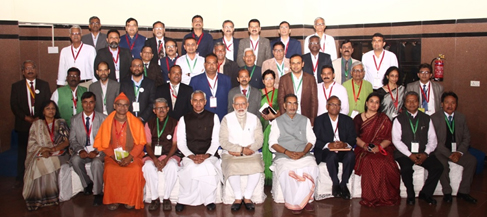 Agriculture’s percentage contribution to the National GDP has been on a decline since the 1950’s. As of 2016, as per the World Bank statistics, agriculture was contributing about 17.4% to the country GDP. However, a major proportion of the population, close to 60% is heavily dependent on agriculture. While green revolution had increased India’s net food production by more than 3 times since 1965-2015, it hasn’t necessarily resulted in an increase in farmer’s income. These macro factors can be substantiated with the difference in the in net relative income from farm and non-farm activities. To this effect, owing to the continued deteriorating trend of absolute and relative income, the Prime Minister of India in 2016 envisioned to double farmers’ income by 2022. To this effect, the nodal ministry – Ministry of Agriculture and Farmer Welfare had set in motion a macro-policy directive that would enable this to be realised. This also became evident in the 2018 budget that was put forth in the Parliament, which had a range of measure to boost the agriculture sector. To this effect, the Ministry of Agriculture and Family Welfare had hosted a closed door expert’s meet on the 19th and 20th of February 2018, after the Budget was presented, to take this agenda forwards. Recognising TERI’s contribution to the field of climate change and agriculture research, the Ministry had invited TERI to participate and share its experiences in this context with key stakeholders that, amongst the Prime Minister, would also include several Governors of states and other domain experts.
Agriculture’s percentage contribution to the National GDP has been on a decline since the 1950’s. As of 2016, as per the World Bank statistics, agriculture was contributing about 17.4% to the country GDP. However, a major proportion of the population, close to 60% is heavily dependent on agriculture. While green revolution had increased India’s net food production by more than 3 times since 1965-2015, it hasn’t necessarily resulted in an increase in farmer’s income. These macro factors can be substantiated with the difference in the in net relative income from farm and non-farm activities. To this effect, owing to the continued deteriorating trend of absolute and relative income, the Prime Minister of India in 2016 envisioned to double farmers’ income by 2022. To this effect, the nodal ministry – Ministry of Agriculture and Farmer Welfare had set in motion a macro-policy directive that would enable this to be realised. This also became evident in the 2018 budget that was put forth in the Parliament, which had a range of measure to boost the agriculture sector. To this effect, the Ministry of Agriculture and Family Welfare had hosted a closed door expert’s meet on the 19th and 20th of February 2018, after the Budget was presented, to take this agenda forwards. Recognising TERI’s contribution to the field of climate change and agriculture research, the Ministry had invited TERI to participate and share its experiences in this context with key stakeholders that, amongst the Prime Minister, would also include several Governors of states and other domain experts.
Dr Arindam Datta, Fellow, TERI, interacted with stakeholders in the presence of the Honourable Prime Minister Shri Narender Modi, Governor of Himachal Pradesh Acharya Dev Vrat at the Agriculture Mission 2022: Doubling Farmers’ Income expert’s meet here in Delhi on the 19th and 20th of February. The discussions revolved around the work TERI is conducting in Rudraprayag under the Himalayan Adaptation, Water and Resilience (HI-AWARE) research project. An interest in the work was shown with discussion around the potential for such work in some part of Himachal Pradesh! Former special chief secretory (Agriculture), Andhra Pradesh Mr. Vijay Kumar chaired the session and appreciated the project as it highlights the opportunities that farmers in certain regions can capitalise on. The project was also appreciated in the session as it was the only description of in-field experience related to horticulture crops.
The targeted livelihood intervention directly relates to Government’s mission, and aims to bolster income through introduction of high value crops alongside tradition crops.
